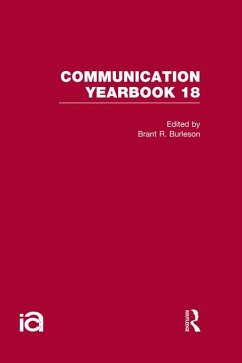The
Communication Yearbook annuals publish diverse, state-of-the-discipline literature reviews that advance knowledge and understanding of communication systems, processes, and impacts across the discipline. Sponsored by the
International Communication Association, each volume provides a forum for the exchange of interdisciplinary and internationally diverse scholarship relating to communication in its many forms. This volume re-issues the yearbook from 1995.
Dieser Download kann aus rechtlichen Gründen nur mit Rechnungsadresse in A, B, BG, CY, CZ, D, DK, EW, E, FIN, F, GR, HR, H, IRL, I, LT, L, LR, M, NL, PL, P, R, S, SLO, SK ausgeliefert werden.









